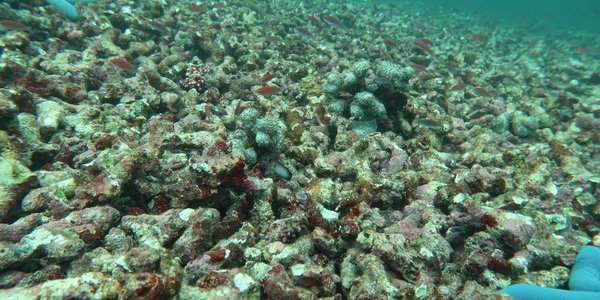- Share this article
- Subscribe to our newsletter
Paris Agreement limits still catastrophic for coral reefs
A team of researchers led by the University of Leeds, United Kingdom, have discovered that more than 90 per cent of tropical coral reefs will suffer frequent heat stress – their number one threat – even under Paris Agreement climate warming limits.
The 2015 Paris Agreement saw 191 countries and the European Union sign up to a collective aim of keeping global average temperatures to less than 2°Celsius (C) above pre-industrial levels and pursuing efforts to limit heating to 1.5°C.
The new research suggests that the future of coral under 1.5°C heating is even worse than predicted by the Intergovernmental Panel on Climate Change, which reported in 2018 that such a level would cause 70 to 90 per cent of coral reefs to be destroyed. Coral reef survival will require significant and urgent action globally to reduce greenhouse gas emissions.
Lead author Adele Dixon, a PhD researcher in the University of Leeds’ School of Biology, said: “Our finding reinforces the stark reality that there is no safe limit of global warming for coral reefs. Following the COP26 in Glasgow, in November 2021, in which some progress was made towards the 1.5°C target, our finding shows that 1.5°C is still a substantial amount of warming for the ecosystems on the frontline of climate change.”
Heat stress danger
In the past few decades, 84 per cent of the world’s tropical coral reefs have had enough time to recover between heat waves that cause bleaching mortality.
But the research team, which included colleagues from Australia and the United States, has found that even at 1.5°C, only 0.2 per cent of reefs will have sufficient recovery time between heat events and 90.6 per cent of reefs will suffer intolerable thermal stress.
Heat stress causes the decline of all reef species and reduces food and livelihood opportunities for people.
The findings were published in February in the journal PLoS Climate.
The researchers set out to discover whether coral thermal refugia would be able to withstand global warming temperatures of 1.5°C and 2°C above pre-industrial levels.
Thermal refugia are areas of coral reef which can maintain suitable temperatures for coral survival even when ocean temperatures in surrounding areas rise. The researchers identified these as areas predicted to suffer severe heat stress less than once per decade, about the time required for reefs to grow back and return to full function after a severe coral bleaching event.
The team used historical data and the latest climate model projections generated by modelling institutions around the world to project future thermal exposure on shallow-water coral reefs globally. From this, the researchers identified thermal refugia and predicted whether they would persist into the future.
Currently, refugia are found in all twelve coral reef regions across the globe: Australia, Brazil, the Caribbean, the Coral Triangle in the Western Pacific Ocean, East Asia, the East Pacific, Fiji, Hawaii, the Indian Ocean, the Persian Gulf, Polynesia and the Red Sea.
The findings showed that under global heating of 1.5°C, refugia would be wiped out in every region except for small areas in Polynesia and the Coral Triangle where lower rates of warming and periodic upwelling events, where colder deeper water is brought to the surface, reduce the frequency of severe heat stress events. However, at 2°C of global warming, these thermal refugia no longer exist.
There are ‘hope sites’ that have high variability in temperatures, such as in the Eastern Pacific. These areas may be better able to cope with temperature extremes.
Identifying and protecting thermal refugia is a popular recommendation for coral reef management. Local actions that remove other stressors such as fishing, tourism, and low water quality, promote resistance and recovery, and facilitate migration of coral to more suitable environments, can all aid reef conservation. But the research team conclude that protecting thermal refugia may only be effective in the short term.
Urgent action needed
Scott Heron, Associate Professor in Physics at the ARC Centre of Excellence for Coral Reef Studies, James Cook University in Townsville, Australia, said: “This analysis confirms that significant action on greenhouse gas emissions is urgent, with significant action needed this decade, but we also need to ramp up local management actions to help reefs survive through predicted impacts.”
Reference:





Add a comment
Be the First to Comment